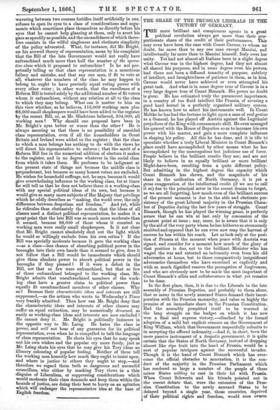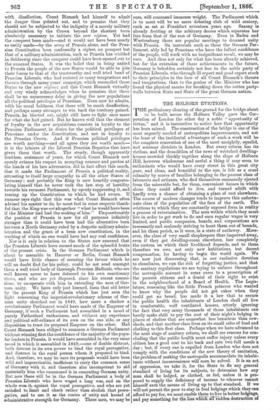THE SHARE OF THE PRUSSIAN LIBERALS IN THE VICTORY OF
GERMANY.
THE more brilliant and conspicuous agents in a great political revolution always get more than their pro- portionate share of the credit of their performances. This may even have been the case with Count Cavour, to whom no doubt, far more than to any one man except Mazzini, and intellectually far more than to Mazzini himself, Italy owes her unity. Yet had not almost all Italians been in a slight degree what Cavour was in the highest degree, had they not almost all shared his purposes, and in some degree even his powers, had there not been a diffused tenacity of purpose, subtlety of intellect, and farsightedness of patience in them, as in him, Cavour would never have achieved or even attempted his great task. And what is in some degree true of Cavour is in a very large degree true of Count Bismark. His power no doubt is great. He has estimated truly the paramount importance, in a country of too fluid intellect like Prussia, of securing a good hard kernel in a perfectly organized military system. He has known how to select his instruments well. In Count Moltke he has had the fortune to light upon a man of real genius as a General, he has played off Austria against the Legitimist prejudices of the King with consummate skill. He even managed his quarrel with the House of Deputies so as to increase his own power with his master, and gain a more complete influence in shaping his policy. All this he has done, and it is idle to speculate whether a truly Liberal Minister in Count Bismark's place could have accomplished by other means what he has 'accomplished by the unscrupulous but judicious use of force. People believe in the brilliant results they see; and are not likely to believe in an equally brilliant or more brilliant Might-have-been, resulting from a quite different policy. But admitting in the highest degree the capacity which Count Bismark has shown, and the magnitude of his share in the unification of North Germany, it is yet a gross exaggeration of the intellectual credit (if we are to call it so) due to the principal actor in the recent drama to forget, as we are all forgetting, how much even of the brilliant success of the present moment is due to the able and obstinate per- sistency of the great Liberal majority in the Prussian Cham- ber of Deputies during the last few years of struggle. Count Bismark, though he has played the winning game, is perfectly aware that he can win at last only by concession of the greatest point at issue ; nay, more, he is aware that it is only by the aid of the very party whom he has hitherto so strenuously snubbed and opposed that he can even now reap the harvest of success he has within his reach. Let us look only at the posi- tion of Prussia at the moment when peace with Austria was signed, and consider for a moment how much of the glory of that position is due, not to the brilliant Minister who has waged the war and extorted an indemnity even from his old adversaries at home, but to those comparatively insignificant adversaries themselves who have exercised so explicitly and with so much dignified reserve the prerogative of forgiveness, and who are obviously now to be made the most important of Count Bismark's allies and collaborateurs in what yet remains to be done.
In the first place, then, it is due to the Liberals in the late assembly of Prussian Deputies, and probably to them alone, that so many in the newly annexed States demand their incor- poration with the Prussian monarchy, and value so highly the promise of an immediate share in the Prussian Constitution. Had the assembly permitted itself to be worsted in the long struggle on the budget on which it has now won a final and express victory,—clinched by the formal adoption of a mild but explicit censure on the Government of King William, which that Government respectfully submits to in accepting the offered indemnity,—had it, in short, been the mere passive instrument of a despotic government, it is quite certain that the States of North Germany, instead of dropping almost like ripe fruit into the hand of Prussia, would be a nest of popular intrigues against the successful invader. Though it is the hand of Count Bismark which has over- come the official obstacles to annexation, it is the con- duct of the majority in the Prussian Parliament which has rendered so large a number of the people of these minor States willing to cast in their lot with Prussia. When Count Schwerin and his friends pointed out in the recent debate that, were the extension of the Prus- sian Constitution to the newly annexed States to be delayed beyond a single year, those countries, deprived of their political rights and freedom, would soon swarm
'ith disaffection; Count Bismark had himself to admit the danger thus pointed out, and to promise that they should not be subjected to the indignity of a merely military administration by the Crown beyond the shortest term absolutely necessary to initiate the new regime. Yet had the conquest been made—and it would not have been nearly so easily made—by the army of Prussia alone, and the Prus- sian Constitution been confessedly a cipher, no prospect but that of a military administration, such as Prussia has wielded in Schleswig since the conquest could have been opened out to the annexed States. It was the belief that in being united to Prussia the people of the new States would be able to join their forces to that of the trustworthy and well tried band of Prussian Liberals, who had resisted so many temptations and threats through many years' campaign, which reconciled those States to the new regime; and this Count Bismark virtually and very wisely acknowledges when he promises that there shall be no unnecessary delay in giving the new populations all the political privileges of Prussians. Even now he admits, with his usual boldness, that there will be much disaffection, and perhaps many attempts to win back the territory gained. Prussia, he blurted out, might still have to fight once more for what she had gained. But he knows well that the element of loyalty in the new acquisitions consists in loyalty to the Prussian Parliament, in desire for the political privileges of Prnssians under the Constitution, and not in loyalty to the Prussian Crown. And if Prussian political privileges are worth anything—and all agree they are worth much— it is the labours of the Liberal Prussian Deputies that have given them that worth. The steady, though apparently fruitless, resistance of years, for which Count Bismark now openly evinces his respect in accepting censure and pardon at the hands of his late adversaries, did in fact effect this much, that it made the Parliament of Prussia a political reality, attracting to itself large sympathy in all the other States of Germany ; and probably the King is now heartily congratu- lating himself that he never took the last step of hostility towards his recusant Parliament, by openly suppressing it, and tearing up the Constitution to which he had sworn. If rumour says right that this was what Count Bismark often advised his master to do, he must feel in some respects thank- ful that the King was not altogether " what he would have been if the Minister had had the making of him." Unquestionably the position of Prussia is now for all purposes infinitely stronger than it could have been had the alternative been between a North Germany ruled by a despotic military admin- istration and the grant of a bran new constitution, in the working of which no one would have had any real confidence. Nor is it only in relation to the States now annexed that the Prussian Liberals have earned much of the splendid fruits of the present crisis. In the German Parliament which is about to assemble in Hanover or Berlin, Count Bismark would have little chance of securing the favour which he will no doubt find for his policy, could he not send amongst them a well tried body of thorough Prussian Radicals, who are well known never to have deferred to his own reactionary views, and who are yet disposed, since his recent conces- sions, to co-operate with him in extending the area of Ger- man unity. We have only just learned, from that old letter by the present King of Prussia which has just seen the light concerning the imperial-revolutionary scheme of Ger- man unity sketched out in 1849, how mere a shadow a revolutionary Parliament would have made of the Emperor of Germany, if such a Parliament had assembled in a mood of purely Fatherland enthusiasm, and without any experience and political self-reliance of its own on the one side, or any disposition to trust its proposed Emperor on the other. Had Count Bismark been obliged to summon a German Parliament without winning first the confidence of the majority of the popu- lar leaders in Prussia, it would have assembled in the very same mood in which it assembled in 1849,—one of double distrust, both distrust in its own power to bind the royal prerogative, and distrust in the royal person whom it proposed to bind. And, therefore, we may be sure its proposals world have been wild and impracticable, inefficient to carry the common sense of Germany with it, and therefore also incompetent to aid materially him who summoned it in cementing German unity. But now there will be in the German Parliament a body of Prussian Liberals who have waged a long war, and on the whole won it against the royal prerogative, and who are yet satisfied to limit and check rather than abolish that prero- gative, and to use it as the centre of unity and kernel of administrative strength for Germany. These men, we may be sure, will command immense weight. The Parliament which. is to meet will be no mere debating club of wild oratory, such as sat at Frankfort seventeen years ago. Saxony is already fretting at the arbitrary decree which separates her fate from that of the rest of Germany. Even in Baden and Wurtemburg there are popular meetings to demand unity with Prussia. On materials such as these the German Par- liament, ably led by Prussians who have the fullest confidence- of the people, will work with no insignificant result, we may be- sure. And thus not only for what has been already achieved, but for the extension of those achievements in the future, Germany is beholden certainly not less to the noble party of Prussian Liberals, who through ill report and good report stuck to their principles in the face of all Count Bismark's threats and temptations, than to the genius of the Minister who has found the physical means for breaking down the rotten party- walls between State and State of the great German nation.































 Previous page
Previous page